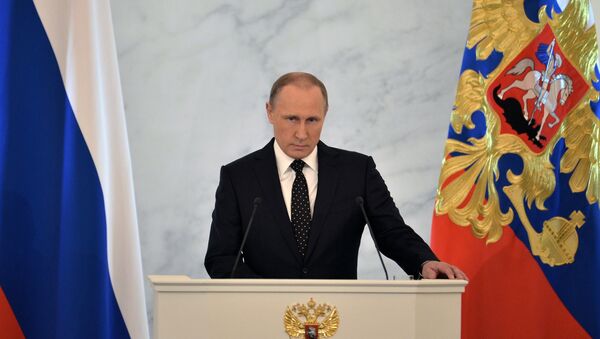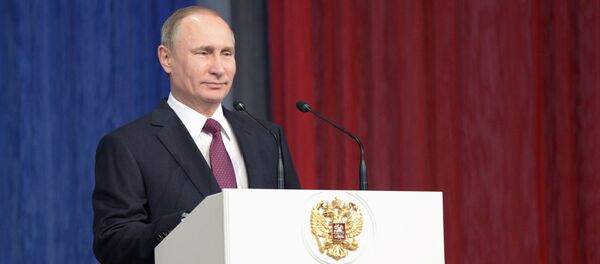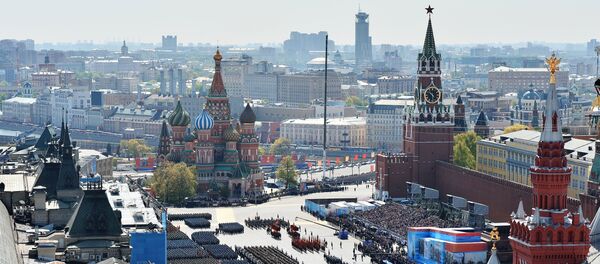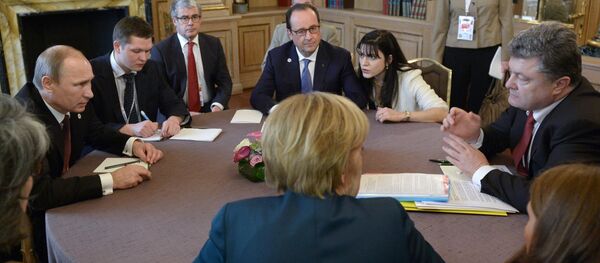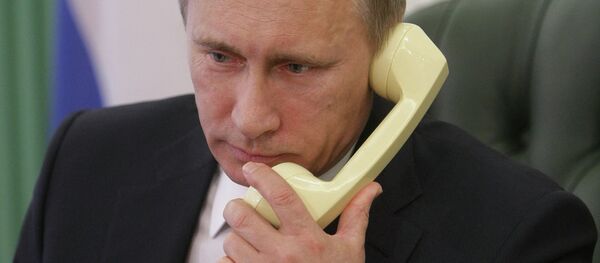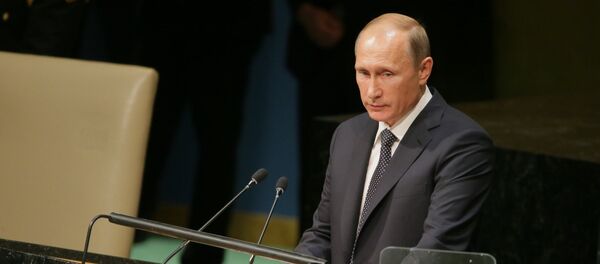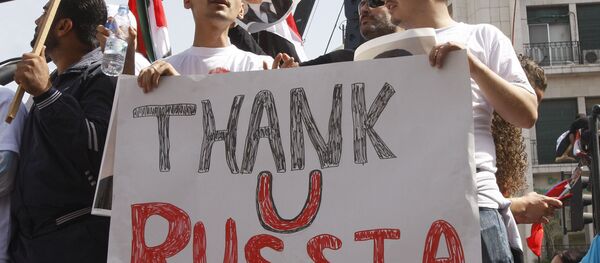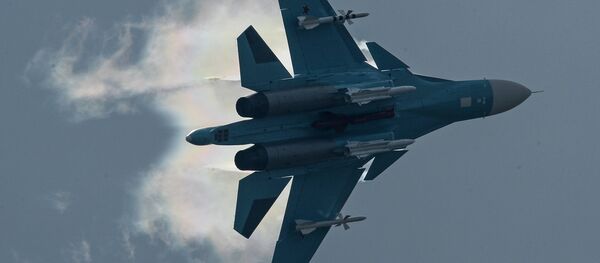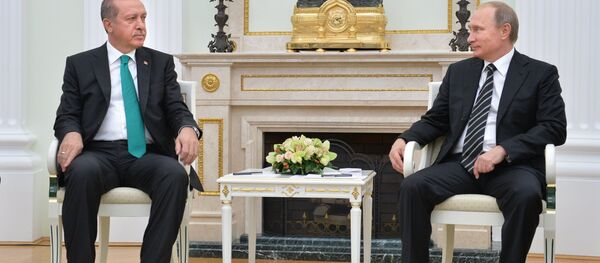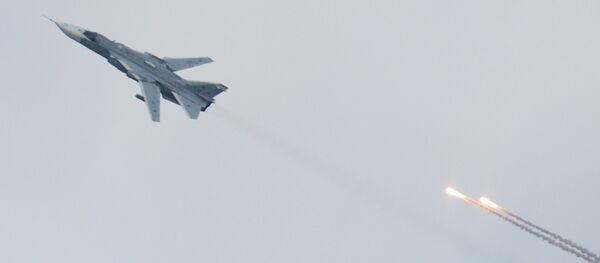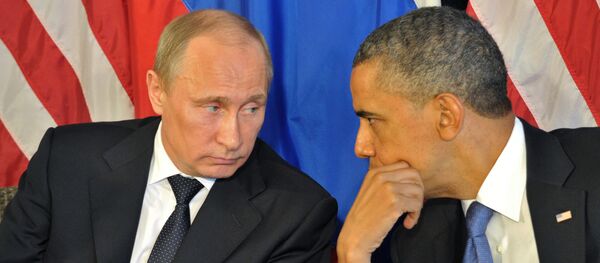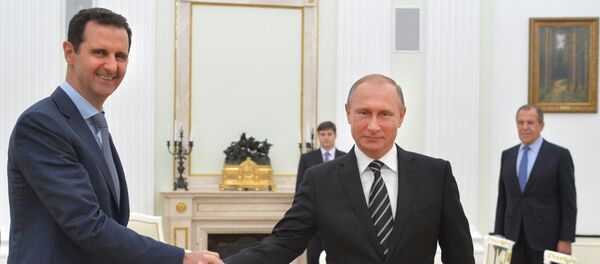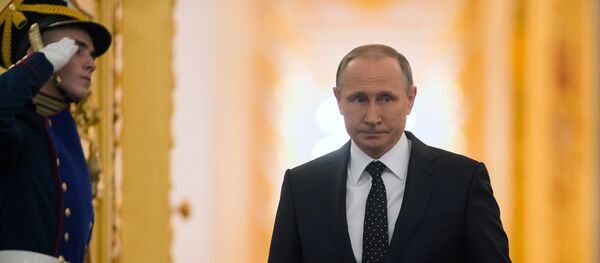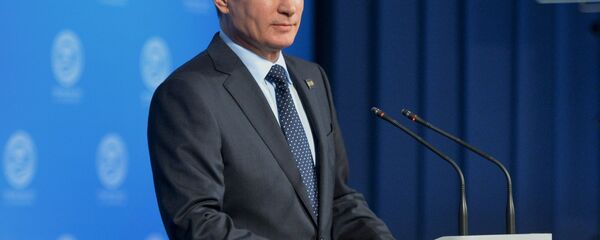MOSCOW (Sputnik) — Russian President Vladimir Putin’s rule in the year 2015 has been marked by a number of milestone events that have influenced both national and global affairs.
Key speeches during global events, meetings with his counterparts from other countries and statements on the most pressing issues have all contributed to a surge in Putin’s ratings and a broad international reaction.
Russian Military Asserting Itself on World Stage
This year, Russia put special emphasis on its defense sphere.
The country increased its defense spending to 3.7 percent of its GDP, and it is currently implementing a $290-billion rearmament program to modernize 70-percent of its military by 2020. According to the Russian Defense Ministry, Russia was due to hold at least 4,000 military drills throughout the year.
Russia’s rearmament schemes were noticed by media outlets both at home and abroad.
In December, The New York Times newspaper published a report on how Russia was bolstering its militarily and asserting "itself on the world stage" under Putin’s leadership as commander-in-chief.
The newspaper listed the country’s investment in its Arctic bases through their expansion and personnel deployment, its growing military expenditure, large-scale military drills and exercises, its involvement in the Syrian crisis, and the modernizing of its military equipment as ways Russia had prepared for a new era this year.
Victory Day Parade
On May 9, Moscow hosted its biggest-ever military parade on Red Square to commemorate the 70th anniversary of the end of World War II in Europe and the defeat of Nazi Germany.
It included over 16,500 service personnel, nearly 200 units of military equipment and about 140 helicopters and planes. Russia’s newest Armata tanks were unveiled during the event.
The Russian leader also expressed his gratitude to the anti-fascists of different countries, including Germany itself, who valiantly fought in partisan squads during the war.
The leaders of Egypt, Vietnam, India, South Africa, and the Czech Republic, as well as the UN secretary-general were among the high-profile figures who attended the event.
Ukraine Peace Mediation
The Ukraine crisis topped the international agenda at the beginning of the year when Putin alongside German Chancellor Angela Merkel, French President Francois Hollande and Ukrainian President Petro Poroshenko met in the Belarusian capital of Minsk.
Following marathon talks on February 11 that lasted for more than 15 hours, the four leaders managed to hammer out a deal in a bid to settle the conflict that flared up in April 2014 after Kiev launched a military operation to suppress eastern Ukraine militia who refused to recognize the authorities that assumed power in the country after the overthrow of former Ukrainian President Viktor Yanukovych.
"This was not the best night of my life. But the morning was good regardless of all the difficulties in the negotiation process and we were able to agree on the important thing," Putin said following the Normandy four meeting.
"We have agreed on many things, in my opinion. The first thing we agreed on is the ceasefire starting from 12 a.m. [local time] on February 15. The second point, which I consider extremely important – is the withdrawal of heavy artillery from the today’s contact line for the Ukrainian army, and from the line marked on September 19 last year in the Minsk agreements for Donbass," Putin said.
He added that "constitutional reform that takes into considerations the legal rights of the people living in Donbas" is one of the most important parts of the deal.
However, the implementation of the deal has been progressing slowly. In June, after yet another escalation of hostilities in Ukraine, Putin stressed that the European Union and the United States were not doing enough to pressure Kiev into implementing the Minsk ceasefire agreements.
For its part, Russia has made efforts to influence the self-proclaimed Donetsk and Lugansk people’s republics, Putin said, adding that the militia was ready to hold talks with Kiev on all the provisions of the Minsk deal.
In a Kremlin statement, released following Putin’s telephone conversation with Merkel, Hollande and Poroshenko on July 24, Putin was quoted as calling on the Ukrainian government to pass legislation recognizing the special status of the self-proclaimed Donetsk and Lugansk People’s Republics (DPR and LPR) in eastern Ukraine.
In September, Putin reiterated this call, stressing that changes to the Ukrainian Constitution and legislation on local elections should be adopted by Kiev after consultations with Donbass. "Such coordination has not been carried out yet," the president stated.
After it became apparent that the Minsk Agreements would not be implemented before the year was out, Putin accused Kiev of purposefully stalling the deal’s execution.
"They are manipulations. If we really want to solve this issue, let's stop doing this. Let's work together on this. And we are ready to negotiate, ready to offer arguments to the people in the southeast so that some compromise is found. We are ready for this and we want this. It is necessary that our partners in Kiev also want this," Putin said at his annual press conference on December 17.
According to the OSCE Special Monitoring Mission in charge of evaluating the implementation of the Minsk Agreements, the ceasefire in eastern Ukraine is generally holding, although a number of violations by both warring sides continue to be registered on a daily basis.
Negotiating the Iran Deal
Under Putin’s presidency, Russia was part of the P5+1 group of international negotiators that on July 14 signed a historic accord to guarantee the peaceful nature of Tehran's nuclear activities.
At the talks, Russia opposed maintaining sanctions and exerting excessive pressure on Tehran since it was demonstrating political will to compromise.
"We stand for the full scale lifting [of the anti-Iran sanctions], as soon as possible, because we believe that it is not the right way to solve international questions and issues," the president said at the height of the negotiation in Vienna.
After the signing of the deal by the negotiators, Putin saluted the important agreement, stating that Russia would do everything it takes to ensure that the deal is implemented in full.
"We are sure that the world breathed a sigh of relief today," Putin said, adding that the deal would enhance international and regional security, global non-proliferation efforts and even the struggle against terrorism.
A day after the historic deal was reached, US President Barack Obama called Putin and thanked the Russian leader for "Russia's important role in achieving this milestone, the culmination of nearly 20 months of intense negotiations."
"Russia was a help on this…. Putin and the Russian government compartmentalized on this in a way that surprised me, and we would have not achieved this agreement had it not been for Russia’s willingness to stick with us and the other P5-plus members in insisting on a strong deal," Obama told the New York Times, commenting on the Iran deal.
United Nations General Assembly
On September 28, Putin addressed the UN General Assembly for the first time in over a decade during its anniversary 70th session in New York. The president touched upon the key issues on the international agenda, putting a main focus on the fight against terrorism.
It was during his speech at the assembly that the Russian leader first called for the creation of a broad coalition to fight terrorism.
"We are suggesting to not be guided by ambition, but by mutual values and shared interests. To unite our efforts based on international law to solve the issues we are facing, and to create a truly broad international anti-terrorism coalition," Putin said at the UN General Assembly, adding that Muslim countries must become key participants in this coalition, as the Islamic State is not only a direct threat to them, "but also defiles Islam."
Putin said the solution to the current military and humanitarian crises lay in providing comprehensive assistance to the legitimate authorities in Syria, as well as restoring government institutions in Libya and supporting the Iraqi authorities.
The Russian leader decried attempts to enforce a single model of development, recalling the Soviet experience in which the exporting of so-called "social experiments" to other countries led to tragic results.
Besides, Putin make a stand for the United Nations, stressing that unilateral actions that circumvent the organization's authority could destroy the architecture of international law as they are illegitimate as well as opposed unilateral sanctions as an instrument used to attain political goals and eliminate market competition.
Fighting Terrorism in Syria
This year, Russia joined the counterterrorism fight in Syria, where a 4-year-long civil war triggered the emergence of multiple extremist groups.
On September 30, Putin announced that Russia would be launching an aerial campaign against the Islamic State (IS, or Daesh Arabic) jihadist group's positions. Putin emphasized that the move was in line with international law and was initiated following a direct appeal by the Syrian leader Bashar Assad.
"The only true way to combat international terrorism — and those fighting in Syria and its neighboring countries are just that, international terrorists — is through pre-emption, and fighting and destroying insurgents in territories that are already occupied, instead of waiting for them to come to our house," Putin said at a meeting with government officials on the day of the operation was launched.
Since the beginning of the campaign, Russian Aerospace Forces have conducted over 4,200 sorties in the span of two and a half months, including 145 flights by strategic and long-range bombers. Notably, Russian jets have destroyed thousands of crude oil tankers, oil storage facilities and oil refineries in Syria.
The air campaign involves Sukhoi Su-25, Su-24M and Su-34 attack aircraft, with the support of Su-30 jets, as well as four of the Caspian Sea Flotilla's destroyers.
The campaign has received huge attention, both in Russia and abroad.
The Syrian Armed Forces have repeatedly hailed the Russian air campaign, saying the airstrikes have inflicted irreparable damage on the terrorists in Syria.
Russia’s efforts have been highly welcomed and commended by the Syrian president.
"I would once again like to thank the Russian people for the help they have given our country and to express hope that we will win the fight against terrorism and will continue to act together in rebuilding the country from an economic and political point of view, as well as for the peaceful existence of all," Syrian leader Bashar Assad said when he visited Moscow in October.
The operation was also praised by the deputy chief of staff of the Iranian Armed Forces, Brig. Gen. Masoud Jazayeri, who called it "efficient, effective and successful."
The Russian campaign also created a platform for Russia’s cooperation with France, which is a member of the US-led coalition that fights Daesh in Syria.
Moscow and Paris agreed to intensify their military information exchange and maintain communication lines between the two countries’ defense ministries on their respective anti-terror operations.
"I think it is time to join our efforts in the fight against Daesh, the Nusra Front, against terrorism…We have a common goal," Chief of Staff of the French Armed Forces Gen. Pierre de Villiers said during talks with his Russian counterpart Valery Gerasimov earlier in December.
Putin confirmed in September that the time frame for Russia’s campaign in Syria would be limited to that of the Syrian army’s offensive. The Russian leader ruled out the participation of Russian armed forces in a ground operation in Syria.
Commenting on the goals of the operation, Putin stressed that for Russia it is primarily self-defense since there are many Russian and CIS nationals in the ranks of the terrorists in Syria who "must be destroyed in distant regions."
Economic Measures Against Turkey
One of this year’s toughest decisions that Putin had to make revolved around imposing sanctions on Turkey after it downed a Russian plane that was taking part in the counterterrorism campaign in Syria.
The decades-long diplomatic and economic partnership between Turkey and Russia came to a standstill on November 24, when a Russian Su-24 jet with two people on board crashed near the Syrian border with Turkey. Ankara claims it downed the Russian plane because it violated Turkish airspace, having repeatedly warned the Russian crew before firing. Both Syrian and Russian military officials confirmed that the Su-24 never crossed into Turkish airspace and was illegally downed.
Putin called the incident a "stab in the back carried out against us by accomplices of terrorists."
Even though Moscow demanded an apology, Turkish Prime Minister Ahmet Davutoglu has failed to apologize for the incident and said he personally ordered the downing of the Russian aircraft.
Putin later said that he had seen no attempts from Ankara to improve relations and stressed, that even despite the hostile act committed by Ankara, Russia does not consider Turkey a hostile country. Putin emphasized that Russia "does not equate" the "hardworking and talented" Turkish people to the country’s ruling elite, "who are directly responsible for the deaths of our servicemen in Turkey."
Meeting of the Year
This year, Putin also held numerous meetings with world leaders and top officials in a bid to expand the counterterrorism fight.
In September, the Russian leader met with US President Barack Obama for the first time in two years on the sidelines of the UN General Assembly in New York.
A 90-minute meeting between the Russian and US heads of state exceeded the original allotted time by nearly an hour. Following the meeting Putin classified the discussion as constructive and frank, although the two sides remain at odds on several key points.
The two leaders also met in November at the UN Climate Change Conference and at the G20 summit in Turkey’s Antalya, where they discussed their joint aims in the fight against terrorism in Syria.
The next high-level contact between Moscow and Washington took place when US State Secretary John Kerry visited the Russian capital in December. Kerry stressed in a meeting with his Russian counterpart Sergei Lavrov and President Putin that the United States was not seeking to alienate Moscow and reaffirmed the ability of the two countries to work effectively while moving in the same direction and concentrating efforts on the fight against terrorism.
During his annual press conference, Putin said that Russia supported the US initiative to prepare a UN Security Council resolution on Syria, which Kerry had brought to Moscow with him.
One of the most groundbreaking meetings Putin had this year was the one with French President Francois Hollande. The Hollande-Putin talks, which took place just after lethal terror attacks in Paris claimed 130 lives, gave hope of broader counterterrorism cooperation between Russia and the West, which until that point had been very limited. The two heads of state agreed on the need to fight terrorism together, something Putin had long called for.
"The talks were held in a trusting, constructive atmosphere. We see that you pay much attention and put a lot of effort into creating a broad coalition against terrorism. You know our stance, we are ready to work together. Moreover, we believe this to be absolutely necessary, and in this regard our positions are the same," Putin said after the meeting with Hollande in Moscow.
"We all suffer from terrorism. Terrorism can strike anywhere in the world, so we must act together. That is the point of our meeting in Moscow. We must act together," Hollande said.
All these negotiations, as well as many months of exhaustive diplomatic work on Syrian crisis settlement resulted in the UN Security Council adopting a historic resolution. The resolution supports a ceasefire in Syria and urges all parties to the Syrian conflict to allow humanitarian agencies to deliver aid to those in need. The document also sets a target of six months for a transitional government to be established, while elections in the country are planned to be held within 18 months.
Approval Ratings
Putin’s approval ratings among Russian citizens, as well as abroad, hit record levels in 2015, while his leadership was also noted by foreign media.
Putin was also included in the shortlist of contenders for TIME magazine’s 2015 Person of the Year award in December.
A poll conducted in Italy by Ipsos in December found that local residents considered Putin the most influential politician in the world.
In June, a poll conducted by the Moscow-based Levada-Center revealed that the president’s had an approval rating of 89 percent. The polling center's data also showed that 64 percent of respondents, who were a representative sample of Russia's general population, approve of the country’s current political course.
Levada-Center also announced that Putin was among the most trusted Russian politicians in July.
"The approval rating of Vladimir Putin’s actions has set a new record of 89.9 percent, breaking the previous record set in June 2015 [of 89.1 percent]," VTsIOM reported, saying that the high rating was due to Putin’s efforts in Syria, including airstrikes targeted at the Islamic State jihadist group.
A poll conducted by Russia’s Public Opinion Foundation in April showed that 76 percent of Russian citizens would vote for Putin’s reelection for a fourth term — his highest approval rating since early 2014. Many political analysts linked his success to Russia’s incorporation of Crimea and its success in the 2014 Sochi Winter Olympics.
